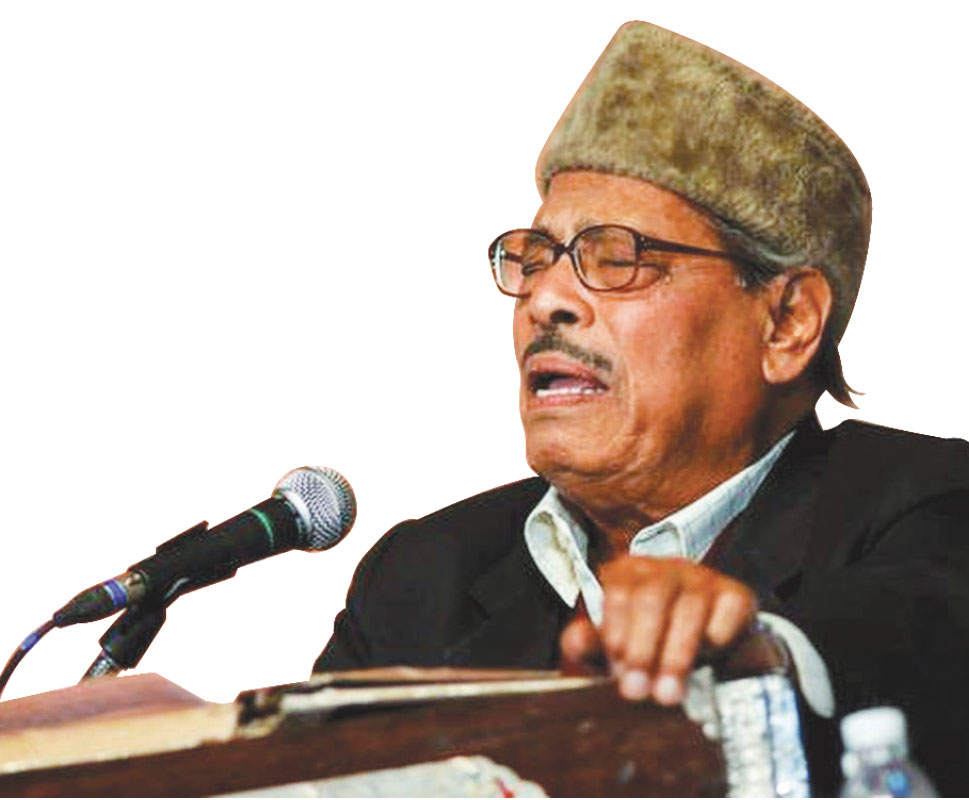
Young singer Kavita Krishnamurthy was excited. A film song of hers had become a chartbuster and she visited her guru Manna Dey to share the happy news with him. “Which song?” Manna Dey enquired. Tu cheez badi hai mast mast from the film Mohra, she responded.
Manna Dey lost his temper and gave Kavita a dressing down. “This song insults the Indian woman, it calls her an object. How can you sing such a song, and denigrate your own gender?” Kavita left the house in tears. But the guru’s harsh words, (which he later regretted) didn’t diminish Kavita’s regard for him.
This incident highlights Manna Dey’s approach to music. He shunned anything obscene or in bad taste. He would refuse to sing if a lyric smacked of vulgarity or had double entendre.
His singing too was principled and organised. He would come to recordings fully prepared, armed with notes and notations — a practice no other playback singer followed.
Manna Dey was the last of the super six male singers of the golden era of Hindi film music — the others being Mohammad Rafi, Hemant Kumar, Mukesh, Talat Mahmood and Kishore Kumar. He outlived all the others — he was 94 when he passed away in 2013. (Mukesh departed in 1976, Rafi in 1980, Kishore in 1987, Hemant Kumar in 1989, Talat Mahmood in 1998). He sang some 4,000 songs in nearly a dozen languages (mainly Hindi and Bengali) in a career that spanned six decades.
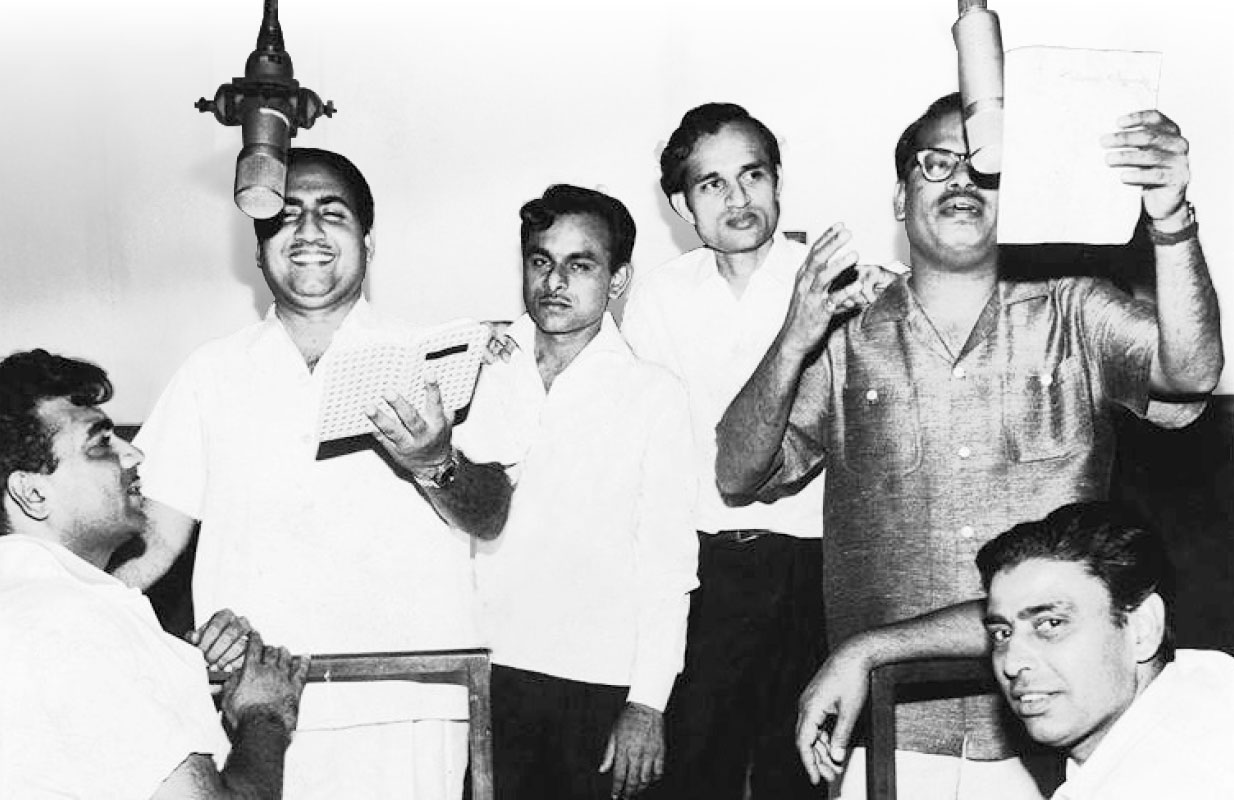
It is often said that Rafi used to pour his heart out in songs; well, Manna Dey poured out his soul. Rafi would tell his fans, “you may listen to anyone, but I listen to Manna Dey.” Composer Anil Biswas perhaps paid Manna Dey the best tribute — “He can sing anyone’s songs, be it Rafi or Kishore or Mukesh, but they can’t sing his songs.” Kavita Krishnamurthy remarked: “Manna Dey gets the toughest of compositions and sings them beautifully.”
He was a master of many styles. But connoisseurs lauded him for the classical excellence he imbibed from his uncle — the legendary blind singer K C Dey — as well as from Ustad Aman Ali Khan. His strengths as singer, apart from classical training, were the power, energy and expressiveness of his voice, his razor-sharp enunciation, and his emphasis on originality. He pursued his own style.
His proficiency with classical music was however both a gift and a curse. He wanted to be a singer of mass appeal, but got branded as a classicist. His songs were often filmed on elderly, mythological or secondary characters. His very first playback song was filmed on sage Valmiki!
He won many honours — the Padma Shri, Padma Bhushan, Dadasaheb Phalke Award, Filmfare and Central government awards for best playback singer, and lifetime achievement awards. A documentary film on him in Bengali was made in 2008.
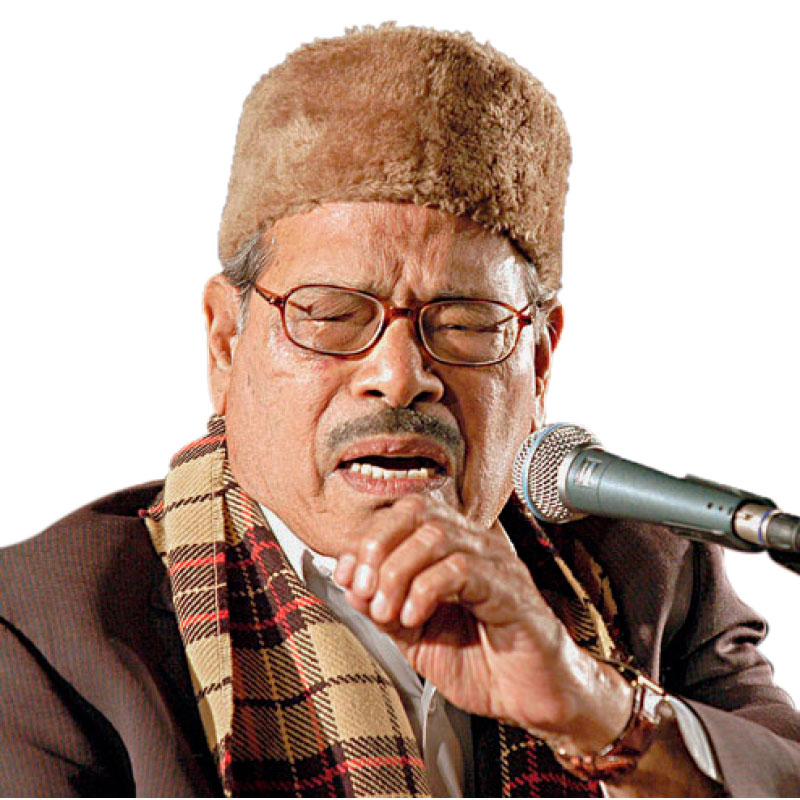
He inspired reverence in many. In his 2007 autobiography, he recalled a touching experience. When he went to a hospital in Bengaluru (the famous Narayana Hrudayala hospital set up by Dr Devi Shetty) for treatment of chest pain, he was astonished to see the entire hospital staff at the gate with bouquets for him. He was treated free of charge: Dr Shetty said that treating Manna Dey was a privilege.
Manna Dey was amazingly versatile. Reputedly the king of qawwalis (he was the prime singer of the inimitable classic Na to karavan ki talash hai, the longest qawwali of Hindi cinema, composed by Roshan in Barsaat ki Raat), he was equally captivating with bhajans. The divine Tu pyar ka sagar hai composed by Shankar-Jaikishen for Seema is really soul-stirring. He excelled both in romantic duets such as Nain mile chain kahan, the peerless duet with Lata Mangeshkar composed by Shankar-Jaikishen for Basant Bahar and philosophical reflections such as the unforgettable Zindagi kaisi hai paheli, composed by Salil Chowdhury for Anand. His patriotic songs, such as the heartbreaking Aye mere pyare watan composed by Salil Chowdhury for Kabuliwallah, were as magnetic as his toe-tapping numbers, such as Ae bhai, zara dekh ke chalo from Mera Naam Joker composed by Shankar-Jaikishen, for which he won a Filmfare Award. Yet, he couldn’t shake off the “classicist” tag and that unfortunately limited his opportunities.
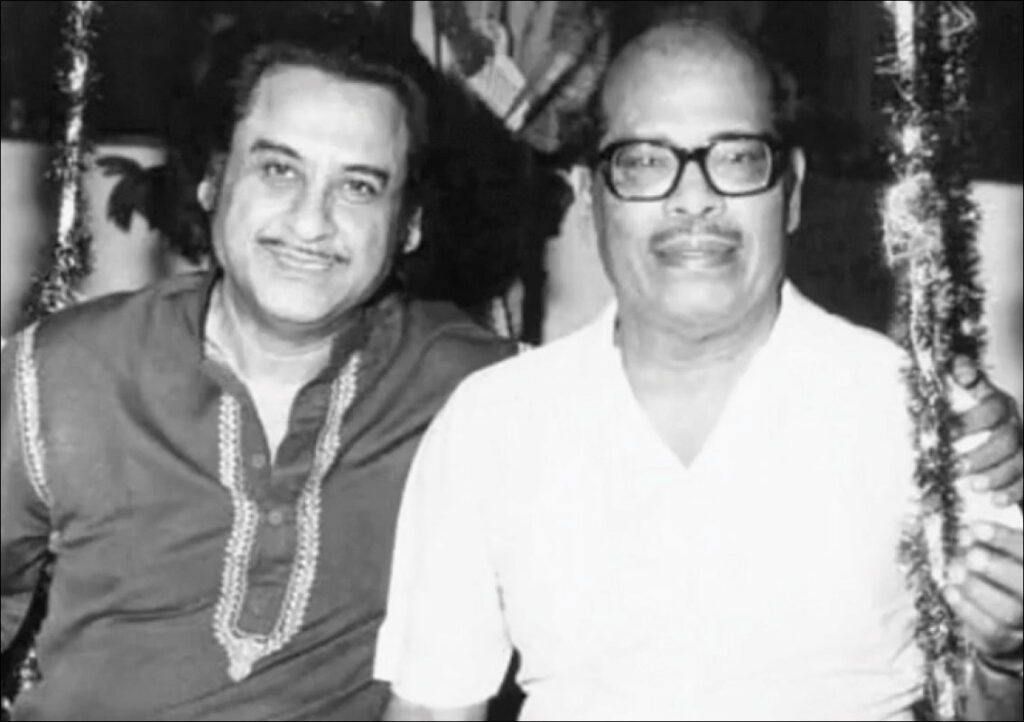
Born in Kolkata in 1919, Manna Dey belonged to a large joint family of 32 members. Sports (football, cricket, kite-flying, boxing and wrestling) consumed his early years, so did pranks and tomfoolery. And of course, music. “As my first uncle, singer and composer, K C Dey, was always singing, there was always music at home.” He sang at school stage shows at the age of 10, and won several music contests in college. He didn’t take up law (which his father wanted him to) or engineering (as his second uncle suggested), but music — as desired by K C Dey.
Manna Dey moved to Bollywood in 1942 along with uncle Dey. But it was a long hard struggle for recognition, and he often thought of giving up his playback dreams and returning to Kolkata.
His first hit song, Upar gagan vishal in the 1950 film Mishaal for which S D Burman composed music, dramatically changed his career. The singer later became a disciple of S D Burman, almost in the guru-shishya tradition. He would regularly buy groceries and bananas and puffed rice for Burman. He would also organise a supply of paan — which Burman was always chewing.
But Manna Dey says he did not resent doing such chores for Burman, because there was a deep bond of affection and respect between them, cemented by many common interests. For example, both were crazy about football. While Manna Dey supported Mohun Bagan, Burman was a votary of East Bengal. The two sparred often.
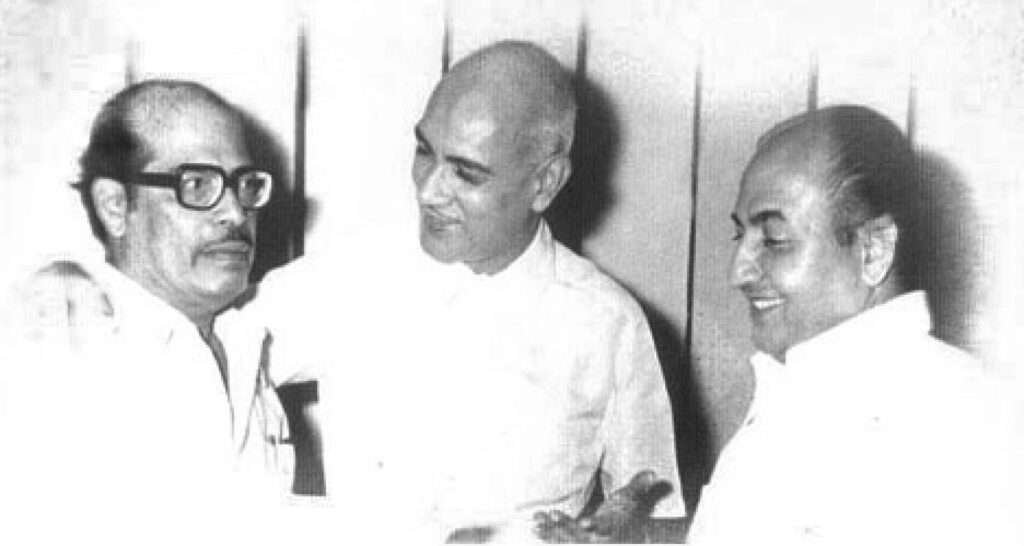
Manna Dey’s most famous song for Burman was the matchless Poocho na kaise main rain beetayi (Meri soorat teri ankhen, 1963), a classical masterpiece filmed on Ashok Kumar.
The singer was eloquent and emotional about the role of Shankar-Jaikishen, particularly Shankar, in promoting his career. He said, “Shankar was the first music director who made me sing romantic numbers… He felt that my masculine rendering of love songs would appeal to the public.”
His first song for Shankar-Jaikishen was the Awara duet Tere bina aag ye chandni with Lata Mangeshkar. Several chartbusters followed. Like Lapak jhapak in Boot Polish; that eternal romantic masterpiece with Lata, Pyar hua ikrar hua (Shri 420); and the two majestically beautiful Chori Chori duets with Lata Mangeshkar — Aja sanam and Ye raat bheegi bheegi.
It was again for Shankar-Jaikishen that Manna Dey sang three alluring classics in Basant Bahar — Sur na saje, Bhey bandana and Ketaki ghulab juhi champak ban phoole. The last one etched its way into immortality — a song with Hindustani classical giant Bhimsen Joshi.
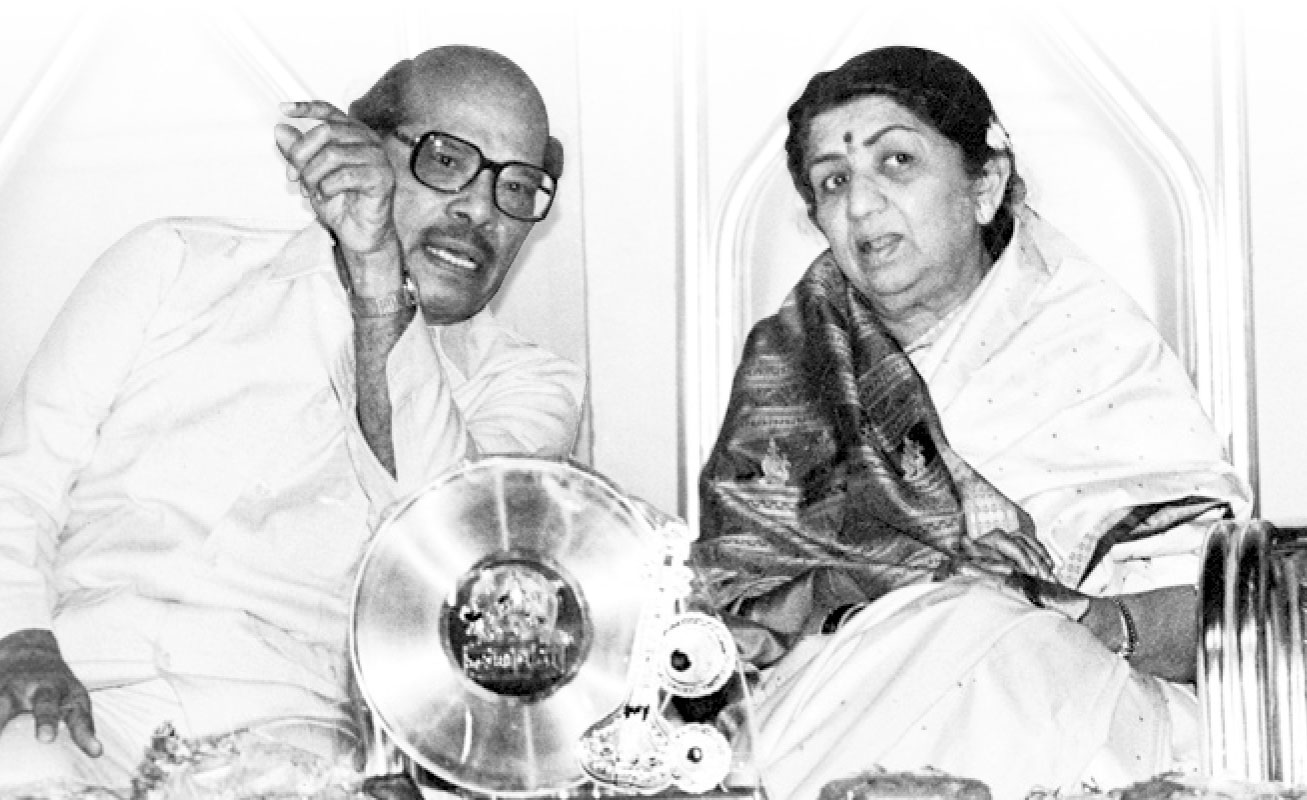
Manna Dey says he was petrified of competing with — let alone defeating — a maestro like Joshi for this song. In fact, he left Bombay and disappeared for some time when the idea of the song was mooted. He said, “I thought it ridiculous that I should prevail over Bhimsen Joshi.” But he was coaxed back and went on to record the song. He was elated when Joshi complimented him, and urged him to become a classical music singer.
Talking about other composers, Manna Dey said Madan Mohan’s compositions stood out with their excellent fusion of classical and folk melodies. The famous song Kaun aya mere man ke dware for Dekh Kabira Roya, is so beguiling, it can stop a listener anywhere. The two Bawarchi songs Tum bin jeevan and Bhor aai gaya andhiyara composed by Madan and filmed on Rajesh Khanna were a rage.
Manna Dey was full of admiration for Salil Chowdhury, for whom he sang Dharti kahe pukar ke — a paean on mother earth — for Bimal Roy’s epic Do Bigha Zameen. Salil also gave him memorable songs for Madhumati, Kabuliwala and Anand. Importantly, Salil helped Manna Dey gain a foothold as a playback singer in Bengali films, and got him to sing the mesmerising love song Manasa maine varu in the Malayalam blockbuster Chemmeen. The song, for which his Kerala-born wife Sulochana Kumaran gave him helpful lessons — became a runaway hit.
His immortal melody Kasme wade pyar wafa sab for Kalyanji-Anandji for the film Upkar created national euphoria. It didn’t win the expected national award for Manna Dey but won him a beautiful tribute by Lata. She said: “This song keeps haunting me, even when I’m about to record a song, and I’m tempted to cancel my own recording session! How did you manage to emote so well?” Two other much-feted, much-loved Kalyanji-Anandji songs sung by him were Yari hain imaan mera, yaar meri zindagi from Zanjeer, filmed on Pran; and the delightful, magical Ae meri zohra jabeen in Waqt, based on an Afghan song and filmed on Balraj Sahni.
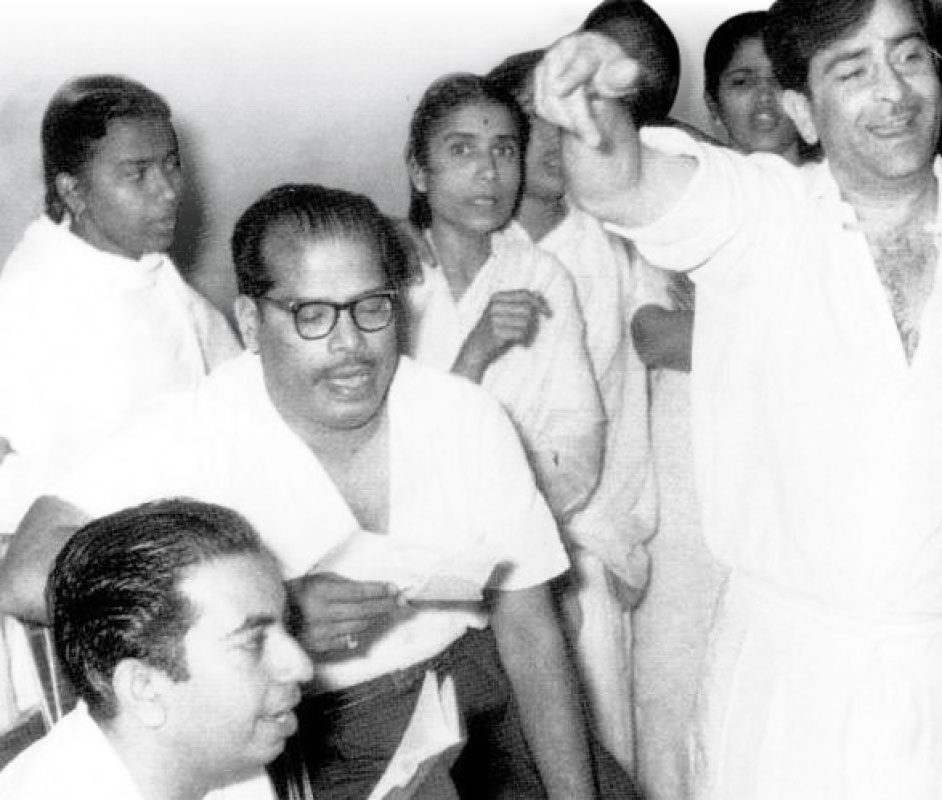
Manna Dey describes R D Burman as “the last genius of Hindi cinema”. His music knowledge and his flair for synthesising Western and Indian classical notes were extraordinary. For him, Manna Dey sang Ao twist karen in Bhoot Bungla (RD told the producer that only this singer, and no one else would sing that song); Aayo kahan se Ghanshyam in Buddha Mil Gaya (which demonstrated RD’s mastery over Indian ragas); the riotous and zany Ek chatur nar (with Kishore Kumar in Padosan); and Yeh dosti, hum nahin chhodengey, the boisterous Sholay motor cycle song with Kishore Kumar.
He was the quintessential singer’s singer. Fellow-singers, Lata Mangeshkar for example, showered him with lavish praise. Manna Dey quotes Lata saying that she had sung 107 duets with him. “She must be right, I have not kept count myself,” he laughed. She lauded Manna Dey’s Marathi pronunciation — saying it was as impeccable as that of a learned Marathi Brahmin.
Rafi was another self-confessed fan of Manna Dey — he once hugged Dey after a recording, saying just one word: “Lajawab”. Manna on the other hand considered Rafi the best Bollywood singer. Both shared a passion for kites and battled each other from their terraces when they were for some time neighbours in Bombay. The Bengali managed to cut down Rafi’s kite often, much to the latter’s discomfiture.
Manna Dey was surprised that in later years Bollywood singers couldn’t stand each other. “It was never like that in our time. Outside the studio we were the best of friends and shared our joys and sorrows with each other.”
Though he didn’t climb the dizzy heights of musical stardom that Rafi and Kishore did, he was admired by one and all as a singer of exceptional brilliance. He was also one of the straightest and cleanest men in the film industry, says Kavita Krishnamurthy. Which is one of many reasons he must be remembered and honoured.
Editor’s pick
- Laga chunari mey daag mitaaoo kaisey
- Poochho na kaisey mainey raat bitayi
- Ae mere pyare watan, ae merey bichhrey chaman, tujh pe dil kurbaan.
- Yeh raat bheegi bheegi, yeh mast samaya
- Ae meri Zohra jabin
The writer is a senior journalist and member of RC Madras South.





